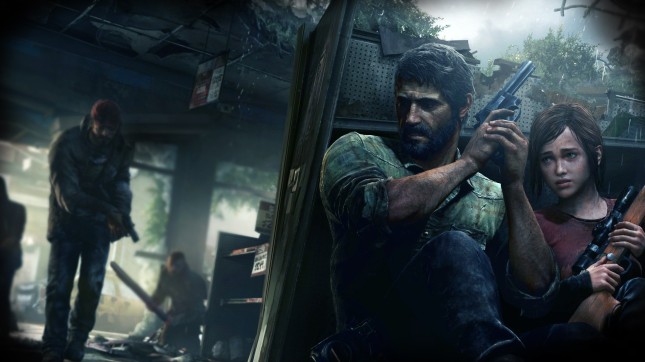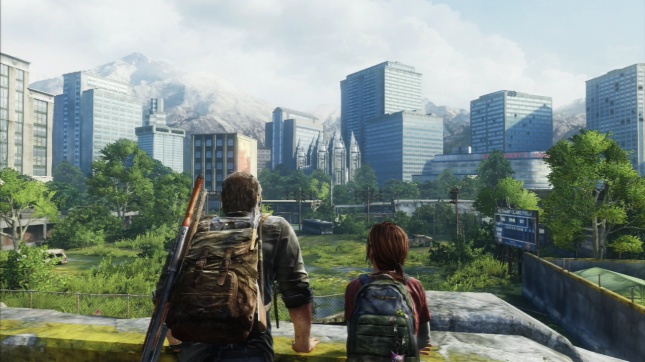BIG GIANT-SERIOUSLY DON’T READ THIS SPOILER WARNING FOR THE LAST OF US
I killed a man yesterday…and I am okay with it.
What’s more concerning is that I felt righteous in my act of violence.
But let’s backtrack a bit shall we?
The Last of Us is a Playstation 3 exclusive from Naughty Dog, makers of Uncharted, Jak and Daxter, and the original Crash Bandicoot. The game takes place in a near future setting where cordyceps have ravaged the planet by mutating and infecting humanity and society, as we know it, is struggling to survive. It’s not a happy place, and Joel, our main character, is not a happy person.
We meet him at the beginning of the outbreak, living in Austin with his daughter and his brother living nearby. Within minutes of starting the game, we see Austin crumble, his daughter shot, and time jump ahead years and years into the future…
…with him staring at an empty bottle.
Yeah, Joel is not in a good place.
Nonetheless, the game continues and through a series of events you end up traveling with Ellie. She’s a young girl who never knew the world before things went to hell, has a mouth like a sailor, and a secret of her own. She’s immune to the infection. Thus the real thrust of the adventure kicks in; you are to take Ellie cross country to the base of “The Fireflies;” a resistance group still working on a cure.
Suffice it to say, you both make it, but not unscathed. Joel wakes up in a room surrounded by guards, and is told in no certain terms that he cannot see Ellie. The reason being, she is being prepped for surgery to remove her brain to find out what causes her immunity. They tell me I can do nothing about it. They’re wrong.
I kill the first guard without thinking; after he tells me where Ellie is…
I snap the necks of a couple of guards who see me as I continue to get closer…
and once the alarms sound, I make sure no one is left to tell where I went…
…because NOTHING is going to stand between me and that girl.
I finally get to the operating room, where two nurses and the surgeon await. I shoot one of the nurses to prove I am not joking around, hoping that they will get the picture, but the Doc pulls a scalpel on me. So I drop him and the other remaining nurse, and take Ellie away from there.
I killed those men and didn’t bat an eye. I felt righteous in my vengeance, and I KNEW I was doing the “right” thing. That’s what it felt like, at least. After all this time, I couldn’t let them lay a hand on this little girl that I had come to love and care for. Hell itself could not stop me in that moment.
Yet; let’s look at this objectively…
-I murdered the only people left looking for a cure to the infection
-I killed one of the last brain surgeons on the planet
-Any hope humanity may have had, is now gone because of my actions
I am not the “good guy.” I am most definitely the “villain.” ….and I am okay with that.
————————————————————————
This is not the first time that a “protagonist” turns out to be something “other,” in any art form. One only has to look to The Road (a big inspiration for the game) and stories like Watchmen to see the trope used in similar ways. Yet, what makes The Last of Us so amazing and worth the discussion is that it puts the actions in the hands of the player.
In other media, we see the drama play out, and we are merely observers to the actions. We see the characters rationalize their behavior, and we follow along. Yet, in a game-space it is the player that acts and rationalizes the actions that he/she must take. The greatest games have narratives that ensure that the player rationalizes those actions.
Nothing could be worse for game’s narrative than ludonarrative dissonance. In other words, for there to be a disconnect between player actions and narrative direction. It is jarring and can take the player out of the moment; to the detriment of the game. An easy example of this is Grand Theft Auto IV‘s Niko Belic, who bemoans his life of violence; but continues to commit heinous acts. Because there is a perceived gap between the Niko that the player sees and the Niko the player controls, there is less investment in the proceedings.
What The Last of Us does so incredibly well is not only remove that dissonance, but have such a strong narrative and emotional component that by the time end game occurs there is no question of what needs to be done. For hours and hours of gameplay, TLoU actively builds the player’s relationship with Ellie. There are optional conversations with her, comics you can pick up for her, and small personal moments that draw you into this relationship.
It is a credit to the creators and writers that by the end of the game, you not only want to protect Ellie, but are willing to kill for her. A few games go that far and are that successful with their stories; but none have ever staked the future of humanity on them.
In a world full of terribly tragic things, gore, and violence; Ellie gives Joel and the player hope. You see people die all around you, you kill just to survive, and one little girl and her book of bad jokes is the only thing that makes this place a little brighter.
The true horror of The Last of Us isn’t the violence, but rather the fact that it is a world that makes good men do bad things…
…it makes the player do BAD things.
This is something that only this type of art form can do. The player is complicit in the actions of the character, rationalizes those actions, and completes them. That’s not something that can be done in books or movies, and is one of the reasons this story is so powerful for so many.
As gaming continues to “grow up,” we’ll continue to see more mature and different types of stories come out of that growth. The Last of Us isn’t a flash in the pan, but the vanguard of a new type of storytelling. It is definitely something to experience on your own, and something to look forward to in the future…






